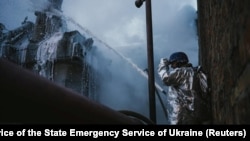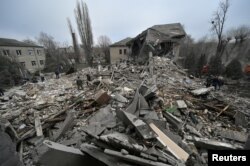The World Health Organization warns increasing Russian attacks on Ukraine’s electricity grid and other critical infrastructure are putting the lives of health care professionals and thousands of patients at risk.
Ukraine’s health system is resilient but WHO officials say hospitals and clinics cannot function when they lack electricity and water.
Speaking from the capital Kyiv, the WHO representative in Ukraine, Jarno Habicht, said Russia has attacked more than 700 health care facilities since it invaded Ukraine on February 24.
These assaults on healthcare, he said have adversely affected facilities, supplies, and transport; injuring, and killing health care workers and patients.
“This marks a clear violation of international law. Health should never be a target. Amid ongoing attacks, WHO continues to deliver lifesaving medical supplies throughout the country…and these supplies and interventions have saved lives and WHO is here, as many others to deliver care and to save lives as we go further,” he said.
Habicht said the WHO, in coordination with Ukraine’s Health Ministry and partners, has delivered medicines, trauma kits, power generators and other supplies, mainly to frontline and newly recaptured areas.
He said up to nine million people have been reached, adding many more will need help to survive Ukraine’s harsh winter. He warns freezing temperatures will increase the risk of respiratory, infectious, and cardiovascular diseases.
He said ongoing attacks on energy and heating infrastructure will decrease the availability of health care services. He adds people are likely to endanger themselves as they struggle to stay warm and heat their homes.
“As people resort to alternative sources of heating for their homes such as coal and wood and using diesel fueled generators or electric heaters, we see the risk of carbon monoxide poisoning will increase as well as other risks,” said Habicht.
Besides its serious physical impacts, he says the war is also creating enormous mental distress. He said WHO estimates up to 10 million people are at risk of some form of mental disorder.
Habicht said WHO has a team of more than 200 personnel delivering supplies and health care services to tens of thousands of people in eight priority areas. He said there are no plans to halt these life saving operations during the holiday season.





